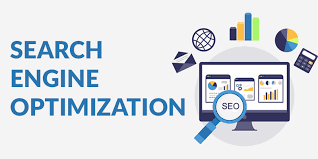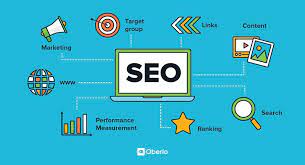The Importance of On-Page and Off-Page SEO
Search Engine Optimization (SEO) is crucial for any website looking to improve its visibility and ranking on search engine results pages. Two key components of SEO are on-page and off-page optimization.
On-Page SEO
On-page SEO refers to the optimization strategies that are implemented directly on the website itself. This includes optimizing content, meta tags, headings, images, and internal linking structure. By focusing on on-page factors, you can improve your website’s relevance and credibility in the eyes of search engines.
Key elements of on-page SEO include:
- Keyword research and optimization: Identifying relevant keywords and strategically incorporating them into your content.
- Title tags and meta descriptions: Creating compelling titles and descriptions that accurately reflect your content.
- Quality content: Publishing high-quality, relevant, and engaging content that provides value to your audience.
- Optimized images: Using descriptive filenames and alt text for images to improve accessibility and search engine visibility.
- User experience: Ensuring your website is easy to navigate, loads quickly, and is mobile-friendly.
Off-Page SEO
Off-page SEO focuses on building external signals that indicate the authority, relevance, and trustworthiness of your website. This involves activities that take place outside of your website but impact its search engine rankings.
Key elements of off-page SEO include:
- Link building: Acquiring high-quality backlinks from reputable websites to increase your site’s authority.
- Social media marketing: Engaging with your audience on social media platforms to drive traffic and build brand awareness.
- Online reputation management: Monitoring online reviews and mentions to maintain a positive brand image.
- Influencer outreach: Collaborating with influencers in your industry to reach a wider audience and gain credibility.
The Importance of Both
Both on-page and off-page SEO are essential for a comprehensive search engine optimization strategy. While on-page optimization helps search engines understand the content of your website, off-page factors demonstrate its credibility and authority in the online world.
By focusing on both aspects of SEO, you can improve your website’s visibility, attract more organic traffic, and ultimately achieve higher rankings in search engine results pages.
7 Key Benefits of On-Page and Off-Page SEO for Boosting Your Website’s Performance
- 2. Helps improve user experience by creating high-quality, relevant content that engages visitors.
- 3. Enables you to target specific keywords and phrases to attract your target audience.
- 4. Enhances the credibility and authority of your website in the eyes of search engines.
- 1. Builds valuable backlinks from reputable websites to boost your site’s authority and rankings.
- 2. Expands your online presence by engaging with audiences on social media platforms.
- 4. Increases brand awareness and visibility by collaborating with influencers in your industry.
- 7.Improves overall domain authority which can positively impact all pages across a website.
Challenges in Balancing On-Page and Off-Page SEO: Time, Complexity, and Delayed Results
- On-page SEO can be time-consuming, requiring regular updates and optimization of content and technical elements.
- Off-page SEO efforts, such as link building, can be challenging and may not always result in quality backlinks.
- Balancing on-page and off-page SEO strategies can be complex, requiring a deep understanding of search engine algorithms.
- Results from on-page and off-page SEO efforts may take time to show significant improvements in search engine rankings.
2. Helps improve user experience by creating high-quality, relevant content that engages visitors.
One significant benefit of both on-page and off-page SEO is their ability to enhance user experience by generating high-quality, pertinent content that captivates and engages website visitors. By focusing on creating valuable and relevant content, businesses can attract and retain users, ultimately improving their overall satisfaction and interaction with the website. This user-centric approach not only helps in building credibility and trust with the audience but also plays a crucial role in driving organic traffic and boosting search engine rankings.
3. Enables you to target specific keywords and phrases to attract your target audience.
By utilizing both on-page and off-page SEO strategies, you can effectively target specific keywords and phrases to attract your desired audience. On-page SEO allows you to optimize your website’s content with relevant keywords, meta tags, and headings, making it easier for search engines to understand the purpose of your site. Meanwhile, off-page SEO efforts such as link building and social media marketing help increase the visibility of your website for those specific keywords across the internet. This targeted approach enhances your chances of reaching and engaging with your target audience, driving more qualified traffic to your site and ultimately boosting your online presence.
4. Enhances the credibility and authority of your website in the eyes of search engines.
By implementing both on-page and off-page SEO strategies, you can significantly enhance the credibility and authority of your website in the eyes of search engines. On-page optimization ensures that your website’s content is relevant and well-structured, while off-page efforts such as link building and social media engagement establish your website as a reputable source of information. Search engines value websites that demonstrate expertise and trustworthiness, and by focusing on both aspects of SEO, you can strengthen your website’s reputation and improve its ranking in search results.
1. Builds valuable backlinks from reputable websites to boost your site’s authority and rankings.
One significant advantage of off-page SEO is the ability to build valuable backlinks from reputable websites, which plays a crucial role in boosting your site’s authority and rankings. By acquiring backlinks from high-quality and trustworthy sources, your website gains credibility in the eyes of search engines, ultimately leading to improved visibility and higher rankings in search results. This strategic approach not only enhances your site’s authority but also increases the likelihood of attracting organic traffic and reaching a broader audience online.
2. Expands your online presence by engaging with audiences on social media platforms.
Engaging with audiences on social media platforms is a significant benefit of off-page SEO. By actively participating in social media marketing efforts, businesses can expand their online presence and reach a wider audience. Through regular interactions, sharing valuable content, and building relationships with followers, companies can enhance brand awareness, drive traffic to their websites, and ultimately improve their search engine rankings. This engagement not only helps in reaching potential customers but also fosters a sense of community and loyalty among existing ones.
4. Increases brand awareness and visibility by collaborating with influencers in your industry.
Collaborating with influencers in your industry is a powerful strategy that can significantly increase brand awareness and visibility. By partnering with influencers who have a strong following and credibility in your niche, you can reach a wider audience and tap into their existing fan base. This collaboration not only exposes your brand to new potential customers but also enhances your credibility and reputation within the industry. Influencers can help amplify your message and promote your products or services in a way that resonates with their followers, ultimately driving more traffic to your website and boosting your online presence.
7.Improves overall domain authority which can positively impact all pages across a website.
Improving overall domain authority through a combination of on-page and off-page SEO strategies can have a significant positive impact on all pages across a website. By enhancing the credibility and trustworthiness of the domain, search engines are more likely to view the website as a reliable source of information, leading to higher rankings for individual pages. This increased domain authority not only boosts organic traffic but also strengthens the online presence of the entire website, ultimately contributing to improved visibility and success in search engine results pages.
On-page SEO can be time-consuming, requiring regular updates and optimization of content and technical elements.
One downside of on-page SEO is the time-consuming nature of the process, as it demands consistent updates and optimization of content and technical elements on the website. This ongoing effort to ensure that the website’s content remains relevant and optimized for search engines can be a significant challenge for website owners and marketers, as it requires continuous monitoring and adjustment to stay competitive in search engine rankings.
Off-page SEO efforts, such as link building, can be challenging and may not always result in quality backlinks.
Off-page SEO efforts, particularly activities like link building, can present challenges as they may not always yield high-quality backlinks. Securing backlinks from reputable and relevant websites requires time, effort, and strategic outreach. Despite the investment in link building campaigns, there is no guarantee of acquiring valuable backlinks that positively impact a website’s search engine rankings. This unpredictability underscores the importance of a well-rounded SEO strategy that balances on-page and off-page optimization to maximize online visibility and organic traffic.
Balancing on-page and off-page SEO strategies can be complex, requiring a deep understanding of search engine algorithms.
Balancing on-page and off-page SEO strategies can be complex, as it necessitates a profound understanding of search engine algorithms. Achieving a harmonious blend of on-page optimization, which involves fine-tuning website content and structure, with off-page tactics like link building and social media engagement, demands a strategic approach that considers the ever-evolving criteria set by search engines. Staying abreast of algorithm updates and industry trends is crucial to effectively navigating the intricacies of both on-page and off-page SEO, ensuring that efforts are aligned to enhance online visibility and drive organic traffic to websites.
Results from on-page and off-page SEO efforts may take time to show significant improvements in search engine rankings.
Results from on-page and off-page SEO efforts may take time to show significant improvements in search engine rankings. Search engine optimization is a long-term strategy that requires patience and consistent effort. While on-page optimizations like keyword research and content creation can lay a strong foundation for your website, it may take some time for search engines to recognize these changes and reflect them in rankings. Similarly, off-page SEO activities such as link building and social media engagement also require time to build credibility and authority in the eyes of search engines. Despite the delay in seeing immediate results, the gradual improvements from both on-page and off-page SEO efforts can lead to sustainable growth and long-term success in organic search rankings.




